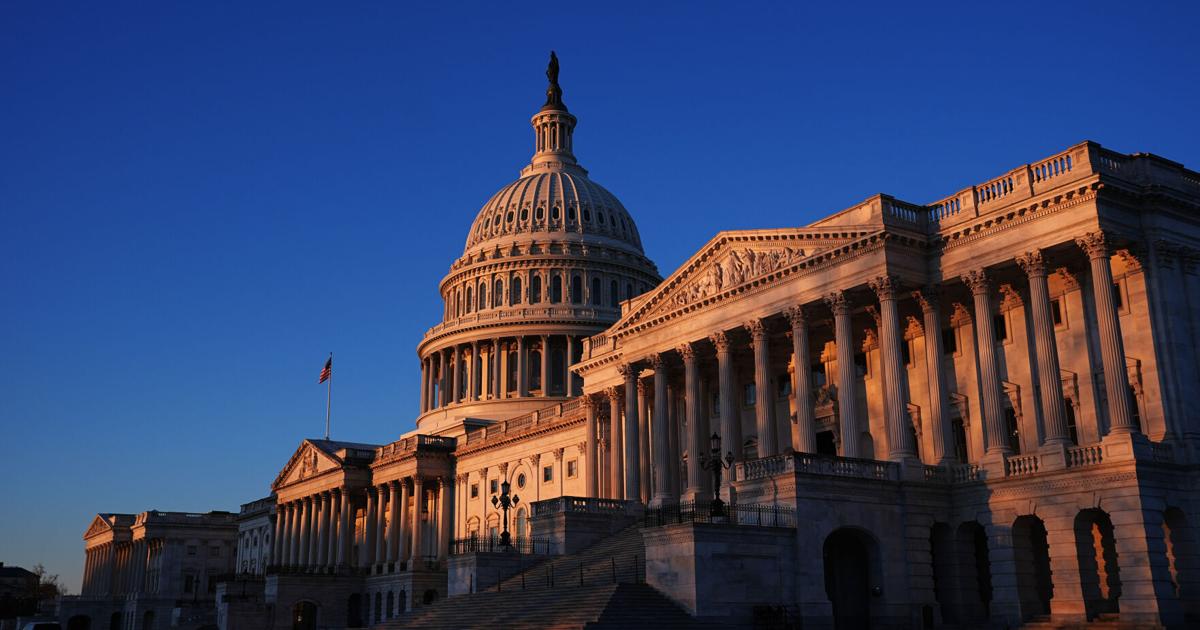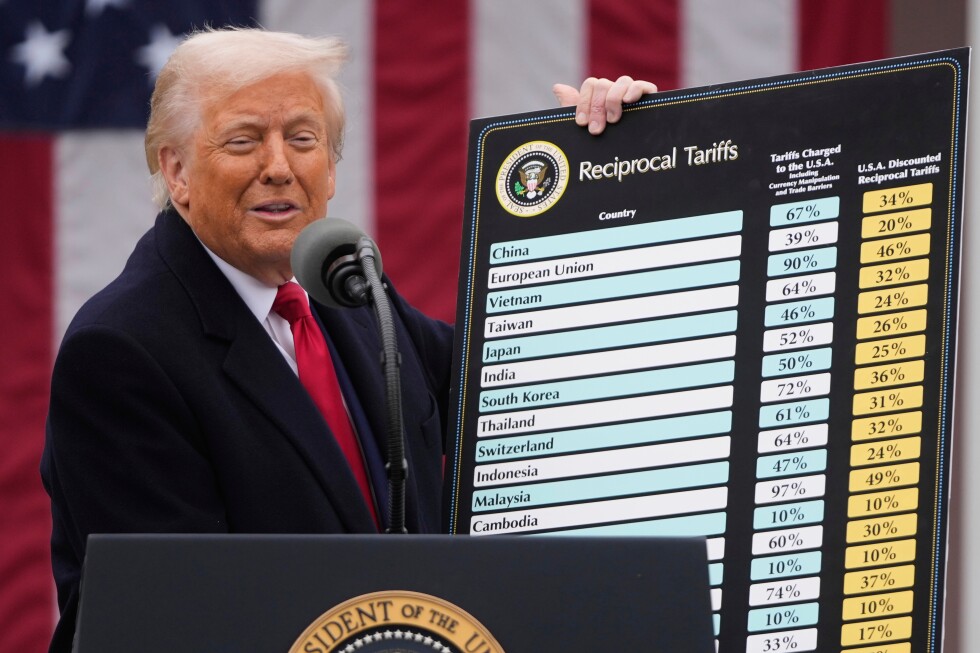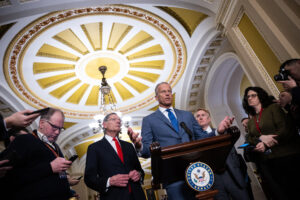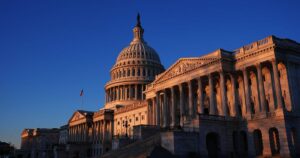The Dictatorship
Trump needs to keep my father’s name out of his speeches this month, and every month

The inauguration of the 47th president of the United States coincided with Martin Luther King Jr. Daythe federal holiday that should prompt us all to reflect on my late father’s legacy of justice, equity and peace. While I noted President Donald Trump’s acknowledgment of my father and his dreamthe address quickly veered away from those ideals. Rather than offering a message of unity, the president outlined a vision focused on undoing much of the progress we have made since the Civil Rights Movement, progress my father tirelessly fought and ultimately sacrificed his life for.
The president outlined a vision focused on undoing much of the progress my father tirelessly fought and ultimately sacrificed his life for.
Since the inauguration, the president’s actions have made clear that that part of his speech was not simply empty rhetoric. Nothing could be further from my father’s dream than planning to lay off all federal employees in diversity, equity and inclusionroles, announcing more repressive immigration policies, promising more ICE raids and overall targeting vulnerable communities. That is not my father’s dream.
The disconnect between the president’s actions and my father’s values serves as a stark reminder that the legacy we leave behind is not just about what we say; it’s more about what we do — and the lasting impact our actions have on the lives of others.
The challenges facing our nation are significant, and the solutions require collaboration, empathy and an unwavering commitment to justice. Scapegoating vulnerable groups or dismantling programs designed to ensure fairness and opportunity runs counter to the values my father championed. It is a reminder that progress is never guaranteed but instead must be defended at every turn.
As we look to the future, I find myself reflecting on what it means to build a legacy. In my book “What Is My Legacy?” which I wrote with my wife, Arndrea Waters King, and our friends Marc Kielburger and Craig Kielburger, I explore the idea that legacy is defined not by wealth or title but by the impact of our daily actions. My father often said, “Everybody can be great, because everybody can serve.” It is through service to others that we create a meaningful legacy.
My parents deeply believed in the power of service to advance justice and foster unity. My mother, Coretta Scott Kingspent years advocating for the establishment of Martin Luther King Jr. Day as a national holiday centered on community service.
Recent crises like the wildfires in Los Angeles remind us of the best of humanity — neighbors helping neighborscommunities uniting in the face of adversity. These moments demonstrate that despite our differences, we can come together when it matters most. In these times of crisis, Americans demonstrate the greatest traits of our nation and its people: empathy, unity and resilience.
But just as my father refused to relent in the face of impossible obstacles, I remain steadfastly optimistic about our future. History teaches us that progress often invites resistance. Every major step forward has faced challenges, from the Emancipation Proclamation to the Voting Rights Act. Yet, my father’s unwavering belief in the power of love, justice and collective action continues to inspire. His dream is not confined to the past; it is a call to action for each of us today.
The decisions we make now will shape the legacy we leave for future generations. I hope our leaders prioritize unity, justice and opportunity for all Americans.
But leadership is not limited to those in positions of power — it is a responsibility we all share. Together, through our actions and commitments, we can realize my father’s dream and ensure his legacy endures.
Martin Luther King, III
Martin Luther King, III, is a global humanitarian, activist, and the elder son of Dr. Martin Luther King, Jr. He is chairman of the board of the Drum Major Institute, the author of “What is My Legacy?” and cohost of the My Legacy podcast alongside his wife, Arndrea Waters King, Marc Kielburger and Craig Kielburger.
The Dictatorship
Trump’s State of the Union will seek to calm voters’ economic concerns

WASHINGTON (AP) — President Donald Trump declared during a marathon State of the Union on Tuesday that “we’re winning so much” — insisting he’d sparked an economic boom at home and imposed a new world order abroad in hopes it can counter his sliding approval ratings.
Trump’s main objective was convincing increasingly wary Americans that the economy is stronger than many believe, and that they should vote for more of the same by backing Republicans during November’s midterm elections. In all, Trump spoke for a record 108 minutes, breaking — by eight minutes — the previous time mark from his address before a joint session of Congress last year.
The president largely avoided his usual bombast, only occasionally veering off-script — mostly to slam Democrats. As he did during such addresses in his first term, Trump relied on a series of surprise special guests to dramatically punctuate his message. They included U.S. military heroes and a former political prisoner released after U.S. forces toppled Venezuelan President Nicolas Maduro.
Trump drew some of the loudest applause of the night when he invited the Olympic gold medal-winning U.S. men’s hockey team into the House chamber.
“Our country is winning again. In fact, we’re winning so much that we really don’t know what to do about it. People are asking me, ‘Please, please, please, Mister President, we’re winning too much. We can’t take it anymore,’” Trump said before introducing the team.
AP AUDIO: Trump uses longest-ever State of the Union to try to convince voters that US is ‘winning so much’
AP correspondent Haya Panjwani reports on President Trump’s 2026 State of the Union address.
The hockey players, wearing their medals and “USA” sweaters, drew a bipartisan standing ovation. Trump pointed to the Democratic side of the chamber and quipped, “That’s the first time I ever I’ve ever seen them get up.”
In a made-for-TV moment, the president announced he would be awarding the Presidential Medal of FreedomAmerica’s highest civilian honor, to the hockey team’s goaltender, Connor Hellebuyck. He also bestowed the Purple Heart on Andrew Wolfe — a National Guard member who was shot while deployed on the streets of the nation’s capital. Wolfe made his first public appearance since then during the speech.
That scene recalled a similar surprise announcement in 2020, when Trump gave the Medal of Freedom to conservative radio host Rush Limbaugh during his State of the Union speech.
Trump decries tariff decision as justices look on
The president championed his immigration crackdowns and his push to preserve widespread tariffs that the Supreme Court just struck down. He drew applause only from Democrats while describing the high court’s decision, which he called “an unfortunate ruling.”
Trump vowed to plow ahead, using “alternative” laws to impose the taxes on imports and telling lawmakers, “Congressional action will not be necessary.” Trump argued that the tariffs are paid by foreign countries, despite evidence that the costs are borne by American consumers and businesses. “It’s saving our country,” he said.
The only Supreme Court justices attending were Chief Justice John Roberts, as well as Justices Brett Kavanaugh, Amy Coney Barrett and Elena Kagan. Trump greeted them personally before the speech, despite last week slamming Coney Barrett — who he appointed to the high court in his first term — for siding with the majority against his tariffs.
Democrats also stood for Trump vowing to halt insider trading by members of Congress. But Rep. Mark Takano, a California Democrat, yelled, “How about you first!” Rep. Rashida Tlaib, a Michigan Democrat, called out, “You’re the most corrupt president!”
When some heckling continued, Trump proclaimed, “You should be ashamed of yourselves.” Later, he pointed at Democrats and proclaimed, “These people are crazy.”
Democratic Rep. Al Green was escorted from the chamber early in the speech, after he unfurled a sign of protest that read “Black People Aren’t Apes!” That was an apparent reference to a racist video the president posted that depicted former President Barack Obama and First Lady Michelle Obama as primates in a jungle. Green was also removed during Trump’s address last year.
The president, meanwhile, was mostly optimistic and patriotic, but Trump struck a darker tone in large swaths of his speech to warn about the dangers posed by immigrants. He invited lawmakers from both parties to “protect American citizens, not illegal aliens” and championed proposals to limit mail-in ballots and tighten voter identification rules.
Affordability gets relatively little time
Trump didn’t dwell on efforts to lower the cost of living — despite polling showing that his handling of the economy and kitchen-table issues has increasingly become a liability. Such concerns about the high costs of living helped propel Democratic wins around the country on Election Day last November.
There also are persistent fears that tariffs stoking higher prices could eventually hurt the economy and job creation. Economic growth slowed in the last three months of last year.
It is potentially politically perilous ahead of November elections that could deliver congressional wins to Democrats, just as 2018’s blue wave created a strong check to his administration during his first term.
On Tuesday, Trump blamed his predecessor, former President Joe Biden, along with Democratic lawmakers in the chamber, saying they were responsible for rising prices and health care costs, two issues his political opponents have repeatedly raised against him.
“You caused that problem,” Trump said of affordability concerns. He added a moment later, “They knew their statements were a dirty, rotten lie.”
Trump also said he’d press tech companies involved in artificial intelligence to pay higher electricity rates in areas where their data centers are located. Such data centers tend to use large volumes of electricity, potentially increasing the cost of power to other consumers in the area.
Another notable off-script moment came as Trump was referencing prescription drug prices, saying, “So in my first year of the second term — should be my third term — but strange things happen,” prompting at least one chant in the chamber of “Four more years!”
Virginia Gov. Abigail Spanberger, who delivered the Democratic response to Trump’s speech, slammed the president’s aggressive immigration policies, his widespread cuts to the federal government and his tariffs.
“Even though the Supreme Court struck these tariffs down four days ago, the damage to us, the American people, has already been done. Meanwhile, the president is planning for new tariffs,” she said. “Another massive tax hike on you and your family.”
A warning to Iran
Trump’s address came as two U.S. aircraft carriers have been dispatched to the Middle East amid tensions with Iran. Trump said, “My preference is to solve this problem through diplomacy.”
“But one thing is certain, I will never allow the world’s number one sponsor of terror — which they are, by far — to have a nuclear weapon,” he added.
The president also recounted U.S. airstrikes last summer that pounded Tehran’s nuclear capabilitiesand lauded the raid that ousted Maduro in Venezuela — as well as his administration’s brokering of a ceasefire in Israel’s war with Hamas in Gaza.
“As president, I will make peace wherever I can,” Trump said. “But I will never hesitate to confront threats to America, wherever we must.”
The Dictatorship
A look at Trump’s false and misleading claims ahead of the State of the Union

WASHINGTON (AP) — On inflation, immigration, tariffs and matters of war and peace, President Donald Trump presented a frequently distorted account of the state of the nation Tuesday as he claimed a “turnaround for the ages” and myriad achievements that don’t pass scrutiny.
Trump has spent the last year boasting of his accomplishments while mocking the record of his predecessor, Joe Biden. But much of this bluster has been based on misinformation, which he again fell back on during his State of the Union address.
President Donald Trump delivers the State of the Union address to a joint session of Congress in the House chamber at the U.S. Capitol in Washington, Tuesday, Feb. 24, 2026. (Jessica Koscielniak/Pool Photo via AP)
President Donald Trump delivers the State of the Union address to a joint session of Congress in the House chamber at the U.S. Capitol in Washington, Tuesday, Feb. 24, 2026. (Jessica Koscielniak/Pool Photo via AP)
Here’s a closer look at the facts:
THE ECONOMY
CLAIM: “When I last spoke in this chamber 12 months ago, I had just inherited a nation in crisis, with a stagnant economy.”
THE FACTS: Not quite. Voters were unhappy with high inflation in the 2024 election, but the U.S. economy was far from stagnant. The U.S. gross domestic product rose 2.8% in 2024 after adjusting for inflation. That’s a stronger pace of growth than the 2.2% achieved last year during the start of Trump’s second term. ___
TRUMP: “Incomes are rising fast, the roaring economy is roaring like never before.”
THE FACTS: Not so. After-tax incomes, adjusted for inflation, rose just 0.9% in 2025, down from 2.2% in 2024, Biden’s last year in office. The annual gain in Trump’s first year is the smallest since 2022, when inflation soared and caused Americans’ inflation-adjusted income to drop.
Wages and salaries are the largest component of incomes, and their growth has slowed as companies have sharply slowed hiring. Workers typically command smaller wage gains in such an environment.
INVESTMENT
CLAIM: “I secured commitments for more than $18 trillion pouring in from all over the globe.”
THE FACTS: Trump has presented no evidence that he’s secured this much domestic or foreign investment in the U.S. Based on statements from various companies, foreign countries and the White House’s own website, that figure appears to be exaggerated, highly speculative and far higher than the actual sum. The White House website offers a far lower number, $9.6 trillion, and that figure appears to include some investment commitments made during the Biden administration.
A study published in January raised doubts about whether more than $5 trillion in investment commitments made last year by many of America’s biggest trading partners will actually materialize and questions how it would be spent if it did.
JOBS
CLAIM: “More Americans are working today than at any time in the history of our country.”
THE FACTS: Yes, but the number of Americans with jobs always rises as the population grows. The relevant figure is the proportion of Americans with jobs, which has fallen significantly in the last quarter-century, partly because the workforce is aging and more people are retired. The proportion of Americans with jobs peaked at 64.7% in April 2000, and was 59.8% in January.
The unemployment rate is a low 4.3%, but was lower when Biden left office in January 2025, at 4%. During Biden’s presidency, the rate fell to a 50-year low of 3.4%.
FOREIGN WARS
CLAIM: “My first 10 months I ended eight wars.”
THE FACTS: This statistic, which Trump frequently cites, is highly exaggerated.
Although he has helped mediate relations among many nations, his impact isn’t as clear-cut as he makes it seem. In at least two instances of peace he claims credit for achieving, there were no wars to end: no fighting between Serbia and Kosovo, and friction rather than fighting between Egypt and Ethiopia over the Grand Ethiopian Renaissance Dam.
The other wars Trump counts as those that he has solved were between Israel and Hamas, Israel and Iran, India and Pakistan, Rwanda and Congo, Armenia and Azerbaijan, and Cambodia and Thailand. His influence varied in those conflicts.
TARIFFS
CLAIM: Tariff revenues are “saving our country, the kind of money we’re taking in.”
THE FACTS: Though Trump has imposed massive tax hikes on imports, they’re not sizable enough to make a dent in the government’s annual budget deficits. Nor have the tariffs corresponded with manufacturing job gains.
President Donald Trump speaks during an event to announce new tariffs in the Rose Garden at the White House, April 2, 2025, in Washington. (AP Photo/Mark Schiefelbein, File)
President Donald Trump speaks during an event to announce new tariffs in the Rose Garden at the White House, April 2, 2025, in Washington. (AP Photo/Mark Schiefelbein, File)
Before the Supreme Court struck down Trump’s tariffs based on an emergency declaration, the Congressional Budget Office estimated that his new taxes would raise $3 trillion over 10 years, or $300 billion annually.
That’s not enough to cover the cost of his $4.7 trillion in tax cuts, including additional interest cuts, that favored companies and the wealthy. Nor is it enough to pay down an annual budget deficit that last year was $1.78 trillion.
___
CLAIM: “Tariffs paid for by foreign countries will, like in the past, substantially replace the modern day system of income tax.’’
THE FACTS: Not likely. Under Trump, tariff revenues have swelled — to $195 billion in the budget year that ended Sept. 30 from $77 billion the year before. But the import taxes accounted for less than 4% of federal revenue. Income taxes and payroll taxes that finance Social Security and Medicare account for 84%.
MEDICINE
CLAIM: “I took prescription drugs, a very big part of health care, from the highest price in the entire world to the lowest. That’s a big achievement. The result is price differences of 300, 400, 500, 600% and more.”
THE FACTS: This is impossible. Although the Trump administration has taken steps to lower drug prices, cutting them by more than 100% would theoretically mean that people are being paid to take medications.
Geoffrey Joyce, director of health policy at the University of Southern California’s Schaeffer Center, said in August that this claim is “total fiction” by the president. He agreed that it would amount to drug companies paying customers, rather than the other way around.
CRIME
CLAIM: “Last year, the murder rate saw its single largest decline in recorded history. This is the biggest decline. Think of it in recorded history, the lowest number in over 125 years.”
THE FACTS: Trump takes credit for a significant decrease in violent crime during 2025, claiming the murder rate in the U.S. dropped to its lowest in 125 years. But this is misleading. Crime had already been trending down in recent years.
A study released in January by the independent Council on Criminal Justice, which collected data from 35 U.S. cities on homicides, showed a 21% decrease in the homicide rate from 2024 to 2025.
The report noted that when nationwide data for jurisdictions of all sizes is reported by the FBI later this year, there is a strong possibility that homicides in 2025 will drop to about 4 per 100,000 residents. That would be the lowest rate ever recorded in law enforcement or public health data going back to 1900.
FBI reports for 2023 and 2024 show significant reductions in violent crimes.
Crime surged during the coronavirus pandemic, with homicides increasing nearly 30% in 2020 over the previous year, the largest one-year jump since the FBI began keeping records. But violent crime dropped to near pre-pandemic levels around 2022 when Biden was president.
IMMIGRATION
CLAIM: “We will always allow people to come in legally, people that will love our country and will work hard to maintain our country.”
THE FACTS: Trump has actually taken steps to restrict who can emigrate to the U.S., often in the name of protecting national security.
He suspended the refugee program on his first day in office and in October resumed the program but only in limited numbers for white South Africans.
Trump has also placed restrictions on who can travel or emigrate to the U.S. from nearly 40 countries around the world. Many of those countries are in Africa.
TAXES
CLAIM: “With the great big beautiful bill, we gave you no tax on tips, no tax on overtime and no tax on Social Security.”
THE FACTS: Though the president frequently says his big tax cut bill means no tax on Social Security, that’s not true for everyone. Not all Social Security beneficiaries will be able to claim the deduction, which lasts until 2029.
Those who won’t be able to do so include the lowest-income seniors who already don’t pay taxes on Social Security, those who choose to claim their benefits before they reach age 65 and those above a defined income threshold. The deductions also phase out as income increases.
ELECTIONS
CLAIM: “I’m asking you to approve the Save America Act to stop illegal aliens and other who are unpermitted persons from voting in our sacred American elections. The cheating is rampant in our elections.”
THE FACTS: He and his allies have never produced evidence of rampant election cheating. Experts say voter fraud is extremely rareand very few noncitizens ever slip through the cracks.
For example, a recent review in Michigan identified 15 people who appear to be noncitizens who voted in the 2024 general election, out of more than 5.7 million ballots cast in the state. Of those, 13 were referred to the attorney general for potential criminal charges. One involved a voter who has since died, and the final case remains under investigation.
1776
CLAIM: “The revolution that began in 1776 has not ended. It still continues because the flame of liberty and independence still burns in the heart of every American patriot.”
THE FACTS: To be clear, the American Revolution started the previous year, on April 19, 1775. The colonies declared independence in 1776. It ended Sept. 3, 1783.
___
Associated Press writers Rebecca Santana, Fatima Hussein, Josh Boak, Paul Wiseman, Christopher Rugaber, Elliot Spagat and Matthew Daly contributed to this report.
___
Find AP Fact Checks here: https://apnews.com/APFactCheck.
The Dictatorship
Trump reportedly isn’t sending a hospital ship to Greenland after all

Early Saturday, Denmark’s Arctic Command made an important announcement: It had evacuated a crew member of a U.S. submarine in need of medical attention, transporting the sailor to Greenland for emergency care.
Soon after, instead of expressing gratitude, Donald Trump published a bizarre statement to his social media platform. According to the American president, he and his administration were deploying “a great hospital boat to Greenland to take care of the many people who are sick, and not being taken care of there.” The Republican concluded, “It’s on the way!!!”
No one seemed to have any idea what in the world he was talking about. When a BLN reporter asked the Pentagon for some kind of explanation, it referred him to U.S. Northern Command, which in turn referred him to the Navy, which in turn referred him to the White House, which didn’t want to talk about it.
Soon after, an apparent explanation for the confusion came into focus. The Wall Street Journal reported:
The Pentagon has received no orders to deploy any U.S. Navy vessels to Greenland, according to U.S. officials, despite President Trump’s claim that a hospital ship is ‘on its way’ to the self-governing Danish territory.
The U.S. has two hospital ships, the East Coast-based USNS Comfort and the West Coast-based USNS Mercy, which are designed as floating medical-treatment facilities. Both vessels are in a shipyard in Mobile, Ala., according to maritime tracking information. The Comfort is undergoing repairs that are expected to be completed in April, while the Mercy is in the middle of a one-year maintenance period that began last July.
Oh. So when Trump publicly declared that a U.S. hospital ship was “on the way” to Greenland (with three exclamation points), that apparently wasn’t true. (The Journal’s report hasn’t been independently verified by MS NOW, though several news organizations have reported in recent days that the Navy has two hospital ships, both of which appear to be in dry dock in Alabama.)
If the reporting is correct, it’s probably a good thing, for a variety of reasons, that there is no hospital ship en route to Greenland. It doesn’t appear to be necessary, and Greenland didn’t want it there anyway.
But the larger significance here is that yet again, there is no meaningful connection between what Trump says he’s going to do and what he actually does.
The incumbent president has earned his reputation as an unusually prolific liar, but this is a specific kind of mendacity. Trump isn’t merely peddling nonsense about his perceived enemies or his record; this is a kind of dishonesty rooted in a disconnect from future events: The American president keeps telling the nation and the world about steps he’s going to take, only to decide later not to bother with them, without offering any kind of explanation for the shift.
After his major defeat at the U.S. Supreme Court, for example, Trump said he’d impose global tariffs at a 15% rate. That wasn’t quite rightand when the policy was announced soon after, the actual rate was 10%.
The Republican said he was going to cap credit card interest rates, and then he didn’t. He said he was going to impose steep economic penalties on any country that does business with Iran, and then he didn’t. He even said he was going to decertify aircrafts made in Canada, and then he didn’t.
For Americans who want to know what’s likely to happen with their own government, it’s generally a good idea to pay more attention to what Trump and his team do than to what they saybecause what he says has little bearing on reality.
Steve Benen is a producer for “The Rachel Maddow Show,” the editor of MaddowBlog and an MS NOW political contributor. He’s also the bestselling author of “Ministry of Truth: Democracy, Reality, and the Republicans’ War on the Recent Past.”
-

 The Dictatorship1 year ago
The Dictatorship1 year agoLuigi Mangione acknowledges public support in first official statement since arrest
-

 Politics1 year ago
Politics1 year agoFormer ‘Squad’ members launching ‘Bowman and Bush’ YouTube show
-

 The Dictatorship6 months ago
The Dictatorship6 months agoMike Johnson sums up the GOP’s arrogant position on military occupation with two words
-

 Politics1 year ago
Politics1 year agoBlue Light News’s Editorial Director Ryan Hutchins speaks at Blue Light News’s 2025 Governors Summit
-

 Politics1 year ago
Politics1 year agoFormer Kentucky AG Daniel Cameron launches Senate bid
-

 The Dictatorship1 year ago
The Dictatorship1 year agoPete Hegseth’s tenure at the Pentagon goes from bad to worse
-
Uncategorized1 year ago
Bob Good to step down as Freedom Caucus chair this week
-

 Politics10 months ago
Politics10 months agoDemocrat challenging Joni Ernst: I want to ‘tear down’ party, ‘build it back up’



